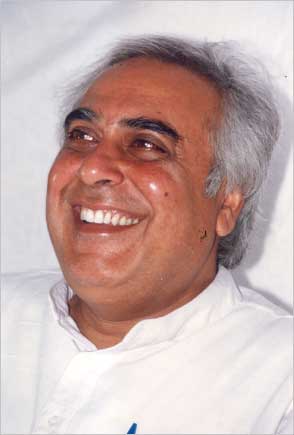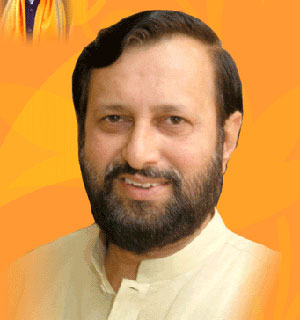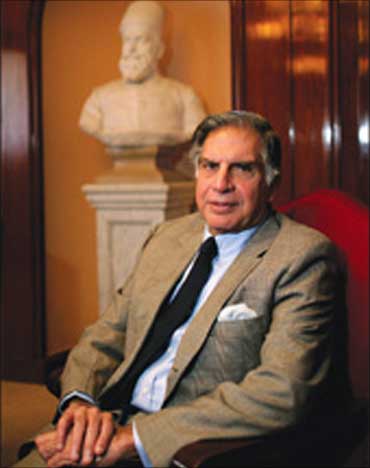 | « Back to article | Print this article |
2G spectrum: Govt to probe allocation since 2001
The government on Thursday appointed a one-man committee of retired Supreme Court justice Shivaraj V Patil to probe the alleged irregularities in the allocation of 2G spectrum since 2001, a period involving the NDA regime.
Announcing the decision, Telecom and IT minister Kapil Sibal told reporters that the committee will "examine the appropriateness of procedures by the DOT in the issuances of licences and allocation of spectrum during the period 2001-2009."
"There are several terms of references, which will be finalised with the one man committee."
Sibal said the committee will look into various procedures followed in issuing licences during the 2001-09 period.
"Broadly speaking, we are looking at the internal departmental procedures adopted by the Department of Telecommunication (DoT) during the period 2001-09 with the issuance of telecom, access service licences and allocation of spectrum to all telecom access service licencees during the above period," he said.
He said the committee will examine procedures, policies and direction of the DoT and the government, and if they were consistently followed or not.
Sibal said the task of the committee would be to check whether the procedure was fair and transparent keeping with the principles of justice, identify instances of lack of transparency, deficiency in procedures, lapses at the policy level and procedural level.
The panel will also look at "whether there were any violation of the policies that were laid down by the DoT itself and then of course remedial measures in that regard," Sibal added.
Click NEXT to read on . . .
Govt to probe into 2G spectrum allocation since 2001
The minister said the one-man committee will have the right to call for records, any DoT officials, get a briefing on any matter.
DoT to send show cause notices to erring telcos by week end
The UPA government will complete the process of sending show cause notices to about six telecom firms for bagging 85 licences in allegedly non-transparent manner by the end of this week.
"We will complete sending notices to the telecom operators by this week," Sibal told reporters on the sidelines of the India Telecom 2010 summit in New Delhi.
The government had earlier said that it will send notices to 85 licencees asking why their licences should not be cancelled for suppressing facts at the time of applying.
These telecom firms will be given 60 days to respond. Many companies are facing allegations of not disclosing all facts while applying for 2G licences in 2007.
The DoT will issue notices in 119 instances, dating back to 2006, for not complying with rollout obligations, Sibal had earlier said.
Last month, the Telecom Regulatory Authority of India had asked the government to cancel 62 licences given to five companies, including Etisalat (Swan), Uninor and Videocon.
Recommendation for this strong action was made to the telecom ministry owing to the companies' non-compliance or irregular rollout of network, as laid down in the contract.
Click NEXT to read on . . .
Govt to probe into 2G spectrum allocation since 2001
The action came amid the Comptroller and Auditor General slamming the telecom ministry for irregularity and impropriety in giving licences to new players in 2008, causing a loss of a whopping Rs 1.76 lakh crore (Rs 1.76 trillion) to the exchequer.
Telecom shouldn't be seen as revenue earner for FinMin: Sibal
Amid debate over whether spectrum should be auctioned or not, Sibal said that the sector should not be viewed as a source of revenue for the finance ministry as high cost of radio waves may prohibit the telcos from providing low tariffs.
"The telecom sector should not be viewed as a source of revenue, especially in the context of the debate taking place today. Everybody is looking at the telecom sector as a source for earning money for the finance ministry," Sibal told reporters on the sidelines of India Telecom 2010.
Government policies of allotting 2G spectrum bundled with the licences and not auctioning has created a big controversy, with the government auditor alleging that non-auctioning of scarce spectrum may have caused a revenue loss of up to Rs 1.76 lakh crore (Rs 1.76 trillion) to the exchequer.
The government had distributed 122 licences in 2008 during former Telecom Minister A Raja's regime at Rs 1,651 crore (Rs 16.51 billion) for pan-India operations. Raja resigned in the wake of row over 2G spectrum allocation scam.
He added that we must also ensure that the industry had enough money to invest in the sector. If price of spectrum is high then "you will reach a situation where you will not be able to provide low tariffs."
Broadband and telecom should be looked upon as a vehicle of empowerment rather than a sector from which we can squeeze money to achieve our fiscal growth, he added.
On auction of spectrum, Sibal said, "If you look at telecom sector across the world, not every country has gone through an auction process... At some point in time, we may not go through the auction process while at others we may. It all depends on where the country is placed."
Click NEXT to read on . . .
Govt to probe into 2G spectrum allocation since 2001
Sibal also talked about a differential pricing policy regime where the operators may be asked to charge operators in the urban areas and offer services in the remote rural areas for free.
Sibal also said that there should be focus on the hardware and telecom equipment sector.
Sibal slams BJP for stalling Parliament
Sibal also flayed the Bharatiya Janata Party for playing politics and stalling Parliament which may have cost the government Rs 70,000 crore (Rs 700 billion).
"The Opposition in the country, particularly the BJP, is not interested in the vindication of the law. They are only interested in stalling Parliament. Parliamentary democracy is our mantra but for them obstruction-ocracy is the mantra," Sibal said on the sidelines of the India Telecom 2010.
The Opposition has been demanding a JPC probe in the 2G spectrum allocation issue while the government has rejected this saying the Opposition is playing politics over it. This has resulted near wash-out of the winter session of Parliament.
"These people are playing politics. They have no interest in the robustness of the sector (telecom). They are looking at the election in 2014. They have no interest in Parliamentary democracy. We have seen this since 2004, tell me one session that the BJP has not stalled. there are such important legislations waiting to be passed in this country," Sibal added.
On opposition's demand of JPC on the telecom scam, Sibal said, "Look at the scam that has taken place in Parliament by their obstruction. This will cost probably Rs 70,000 crore to the country. We should probably have a JPC on that."
'War of words between operators unfortunate'
Earlier, Sibal had termed as 'unfortunate' the war of words between operators and cautioned that such practices were not healthy for the growth of the sector.
Click NEXT to read on . . .
Govt to probe into 2G spectrum allocation since 2001
Asked to comment on operators accusing each other for being favoured by the government in spectrum allocation, he said such discourses in the public domain should be avoided.
"What I find today is very unfortunate, some operators are at war with others. This is because at any given point of time they felt that they had been discriminated against," he said.
However, he ensured a level-playing-field for all the telecom service providers going forward.
When asked about Tata Sons Chairman Ratan Tata accusing Bharatiya Janata Party-led National Democratic Alliance regime for policy flip-flops in telecom sector, Sibal said: "I guess he (Ratan Tata) must be making that statement with some kind of knowledge and information. I cannot comment on that."
The minister, however, did not lose an opportunity to make a point saying that may be the reason why the Opposition, which has been demanding a JPC probe into the 2G issue and has disrupted Parliament proceedings and does not want a debate on it.
Ratan Tata had earlier in the day said that many of the flip-flops in the telecom policies occurred during the BJP regime.
Tatas were accused by Rajya Sabha MP and former BPL chairman Rajeev Chandrasekhar for not being transparent and being one of the biggest beneficiaries of the government telecom policy.
Tata has noted that the government auditor the Comptroller and Auditor General has not ascribed any value to 48 new GSM licences issued to incumbents during 2004-2008 and 65 mhz of additional spectrum.




